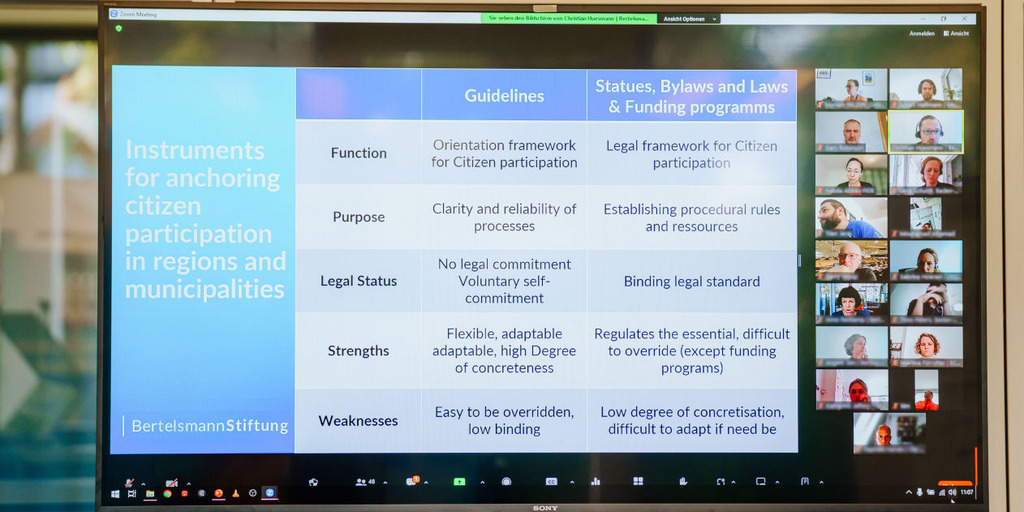The event on 15 September 2023 focused on how participation projects can be institutionalised and embedded in regular policymaking. Together with Gisela Erler, former State Councillor for Civil Society and Citizen Participation in Baden-Württemberg, and experts from all over Europe, the participants discussed ways in which citizen participation can be permanently integrated into regular political decision-making processes. The topics: Involving politicians, communication and public relations, follow-up processes, instruments, methods and permanent mechanisms for institutionalisation and, above all, a participatory culture.

© Marco Seidel
Anchoring citizen participation in Europe - at the local level
Why is citizen participation important and why does it need an institutional framework? Our event revolving around these topics was met with great interest across Europe: more than 120 registered participants from 27 countries and 70 regions, cities and municipalities attended the event. This event is part of the initiative "A new chapter for participatory democracy" of the Bertelsmann Foundation and the European Committee of the Regions.
Content
How can reservations in administration and politics be overcome?
"Positive examples are still the best argument against doubt. And the sceptics must be involved and experience citizen participation first hand," said Gisela Erler, former State Councillor for Civil Society and Citizen Participation in Baden-Württemberg, right at the beginning of the event. She shared her many years of experience with the participants and encouraged them: Baden-Württemberg did not become a trailblazer for citizen participation in Europe overnight. But this lengthy process produced results: In Baden-Württemberg, the average satisfaction with democracy is almost 10% higher than the national average - a direct consequence of citizens being heard, a direct consequence of good citizen participation.
Concrete instruments for an institutional framework
Experts from the cities of Kielce (Poland), Nantes (France), Brussels (Belgium), and Aachen (Germany) presented to the participants in small and large groups a variety of possibilities and good examples of how citizen participation can be institutionalised and firmly anchored at different levels.
Guidelines for good citizen participation, citizen participation statutes or even laws regulating citizen participation can ensure quality standards and define procedures. This creates a framework in which all future participation projects will operate. A central coordination office or participation officer can institutionalise the issue of citizen participation. Concrete instruments such as digital platforms, citizens' committees or institutionalised citizens' councils can perpetuate the exchange between citizens, politics, and administration. All instruments work on their own, but also in interaction.
Interested parties can also get support from the newly founded Competence Centre on Participatory and Deliberative Democracy of the European Commission. Experts gave information on European support for local and regional citizen participation practices.
Anchoring citizen participation - promoting a culture of citizen participation
Arguments for the institutionalisation of citizen participation were summarised by Anna Renkamp, citizen participation expert at the Bertelsmann Foundation: 1. Citizens want their voice to be heard by political decision-makers. 2. Citizen participation improves political outcomes. 3. Citizen participation increases the acceptance of political outcomes. 4. Citizen participation increases trust in politics and democracy. 5. The positive effects on democracy only come to fruition if the quality of citizen participation projects is ensured. 6. To guarantee quality in the long term, participation projects need fixed, institutionalised framework conditions.
An institutional framework and binding rules can contribute significantly to ensuring the quality of citizen participation on a regular, continuous, and long-term basis.
Anna Renkamp, Senior Project Manager, Bertelsmann Stiftung
The discussions showed that change is also needed regarding public attitudes. European democracy needs a participatory culture. Politicians who have a positive attitude towards citizen participation have a key role to play here. At least as important, however, is a public administration with participatory know-how and competences for the management of civic participation projects.
Picture gallery
About the initiative: Capacity building for European municipalities, cities and regions
Building on the 2021 project From local to European and in the run-up to the 2024 European elections, the European Committee of the Regions and the Bertelsmann Foundation have launched a new initiative on Participatory Democracy: A New Chapter of Participatory Democracy. The initiative aims to provide regions, municipalities and cities with the skills they need on the ground to carry out good citizen participation. With concrete assistance, the initiative contributes to bringing good citizen participation to the field.





